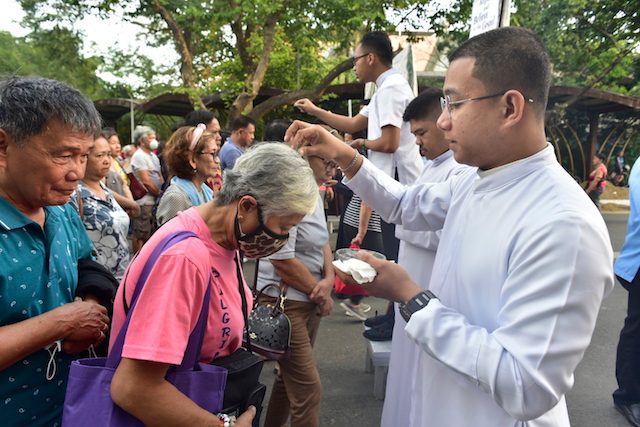SUMMARY
This is AI generated summarization, which may have errors. For context, always refer to the full article.

SINGAPORE – Empty churches ushered in the Catholic season of Lent in Singapore on Wednesday, February 26, as public Masses remained suspended to avoid the spread of the novel coronavirus disease called COVID-19.
February 26 is Ash Wednesday, when Catholics have their foreheads marked with ashes shaped like a cross to symbolize repentance from sin. Ash Wednesday begins the 40-day penitential season of Lent, when Catholics pray, fast, and give alms to purify their lives.
COVID-19 has disrupted Ash Wednesday, however, for millions of Catholics in affected Asian territories. Asia is the region hardest hit by the novel coronavirus that originated in Wuhan, China.
According to the World Health Organization as of Tuesday, February 25, South Korea has at least 977 novel coronavirus cases; Singapore has 90; Hong Kong has 81, including two deaths; and the Philippines has 3, including one death. China and its territories have 77,780 novel coronavirus cases, including 2,666 deaths.
The situation in Asia shows how even religious practices, unchanged for centuries, have to take a backseat temporarily to help stop an epidemic.
In South Korea, where 5.8 million people or 11.1% of the population belong to the Catholic Church, Masses have been suspended from February 26 to March 10.
In Singapore, while the government has not banned religious gatherings, it was the Roman Catholic archbishop himself, William Goh, who decided to cancel public Masses for an indefinite period starting February 15. There are around 300,000 Catholics in Singapore, a city-state of 5.7 million people.
The suspension of Masses is a deeply emotional issue for Catholics here. Many of the faithful here, a Chinese majority country, are converts who take their faith more seriously than cradle Catholics.
Monsignor Philip Heng, rector of Singapore’s Catholic cathedral, recounted in a bulletin how a female young professional called him and “cried her heart out when she heard of the suspension of Masses.” Heng himself admitted that the suspension of Masses in Singapore is unprecedented.
The woman, whom Heng called Maria (not her real name), exclaimed over the phone, “Why no Masses?! How are we to go on? Why? Has Jesus abandoned us?” Heng, who pacified Maria, said Catholics should spend this time reflecting, “Do I value the Mass more deeply through this period of ‘suspension’?”
In Hong Kong, the interim leader of the Catholic Church, Cardinal John Tong, made a similar decision to suspend public Masses, including the one on Ash Wednesday.
Hong Kong has 399,000 Catholics, 44% of whom are migrants from predominantly Catholic Philippines.
Do-it-yourself
Catholics in these countries now have to rely on online Masses. In Singapore, the archbishop will instead lead an Ash Wednesday Mass that will be livestreamed on https://youtube.com/catholicsg at 7:30 pm on February 26.
Catholics in Singapore can also collect ashes on their own. The Archdiocese of Singapore said at least 3 parishes will distribute individual packs of blessed ashes, which will be given out on a first-come, first-served basis:
- Church of the Holy Trinity (20 Tampines Street) – 10 am onwards
- Church of the Sacred Heart (111 Tank Road) – 10 am to 1 pm, and 4:30 to 6:30 pm
- Church of the Transfiguration (51 Punggol Central) – 3 to 7 pm
The Church of the Sacred Heart, for example, said Catholics can “follow the Mass online and mark themselves with the ashes during the livestream Mass.” The parish announced on Facebook, “Recite the words, ‘Remember, that you are dust, and to dust you shall return,’ or ‘Repent, and believe in the Gospel,’ as you mark yourselves with the ashes.”
Sprinkling ashes instead
While the Philippines only has 3 COVID-19 cases and the government has allowed public gatherings, the Catholic Church said it is taking no chances.
The head of the Catholic Bishops’ Conference of the Philippines, Davao Archbishop Romulo Valles, recommended a deviation from the usual practice of marking foreheads with ashes. To minimize physical contact and prevent the spread of COVID-19, Valles urged parishes to instead sprinkle ashes on the crown of the head.
Valles said this sprinkling of ashes calls to mind the anointing on the crown of the head, which Catholics received at baptism. He said these ashes “signify our repentance from sin, which has marred the grace of baptism.”
Eight out of 10 Filipinos belong to the Catholic Church, and millions of people in this former Spanish colony troop to churches on Ash Wednesday.
“As we begin the season of Lent, we are reminded of the constant call for renewal in our Christian life by self-control (fasting and abstinence), generosity and charity (almsgiving), and prayer. Our charity is also expressed in our concern for the well-being of our brothers and sisters, thus our utmost care and efforts towards the prevention of the spread of COVID-19,” Valles said.
Bishop Broderick Pabillo, temporary head of the Archdiocese of Manila, said changes in church practices due to COVID-19 should not distract Catholics from the meaning of Lent. Pabillo is heading the Archdiocese of Manila while Pope Francis has not appointed the replacement of Manila archbishop emeritus Luis Antonio Cardinal Tagle.
“More than where the ash is imposed and in what manner, the meaning is the same. The ashes imposed on us is a call to humility and repentance,” Pabillo said. “Let us not be side-tracked by the coronavirus in living the season of grace this Lent.” – Rappler.com
Add a comment
How does this make you feel?
There are no comments yet. Add your comment to start the conversation.